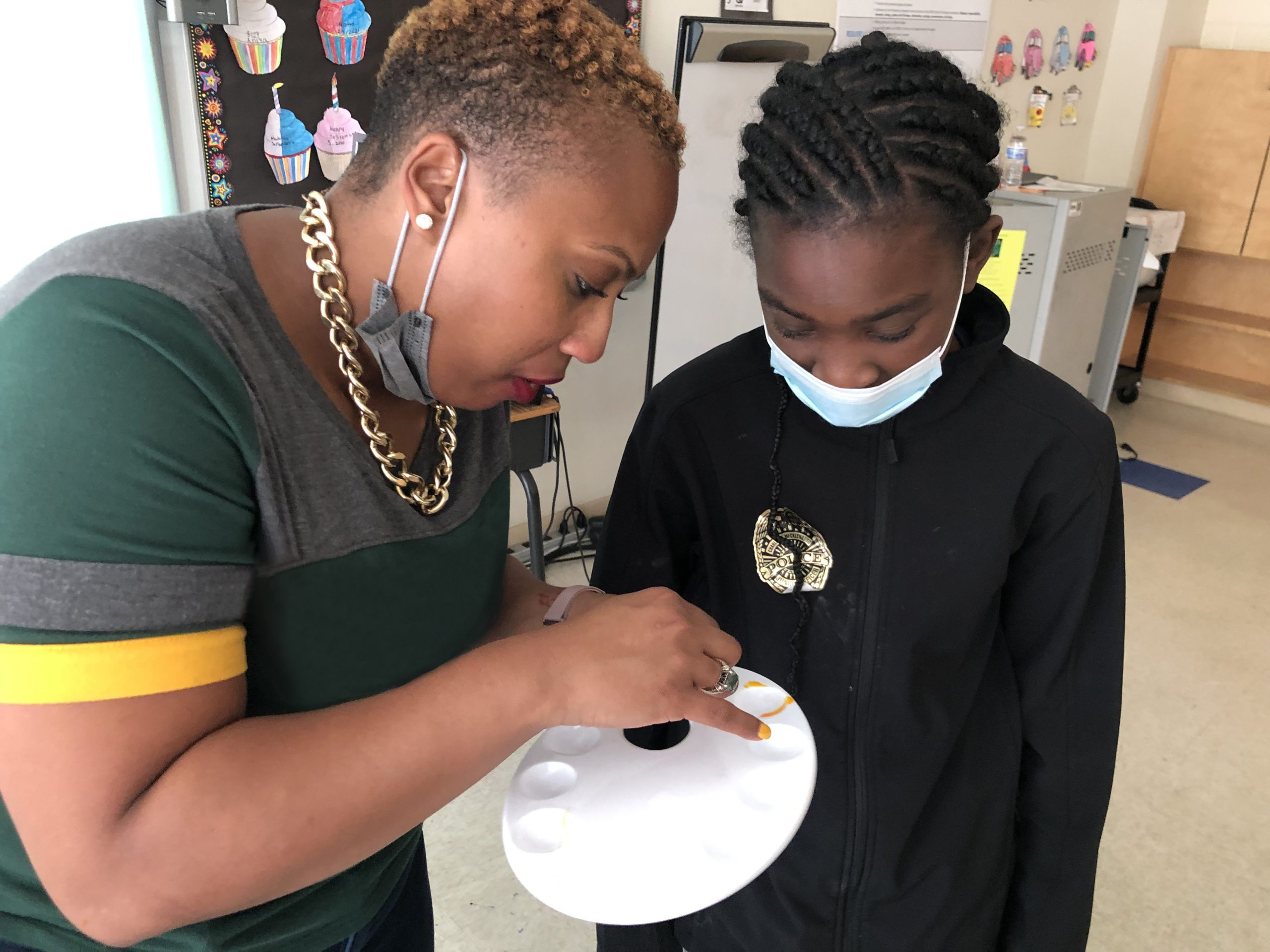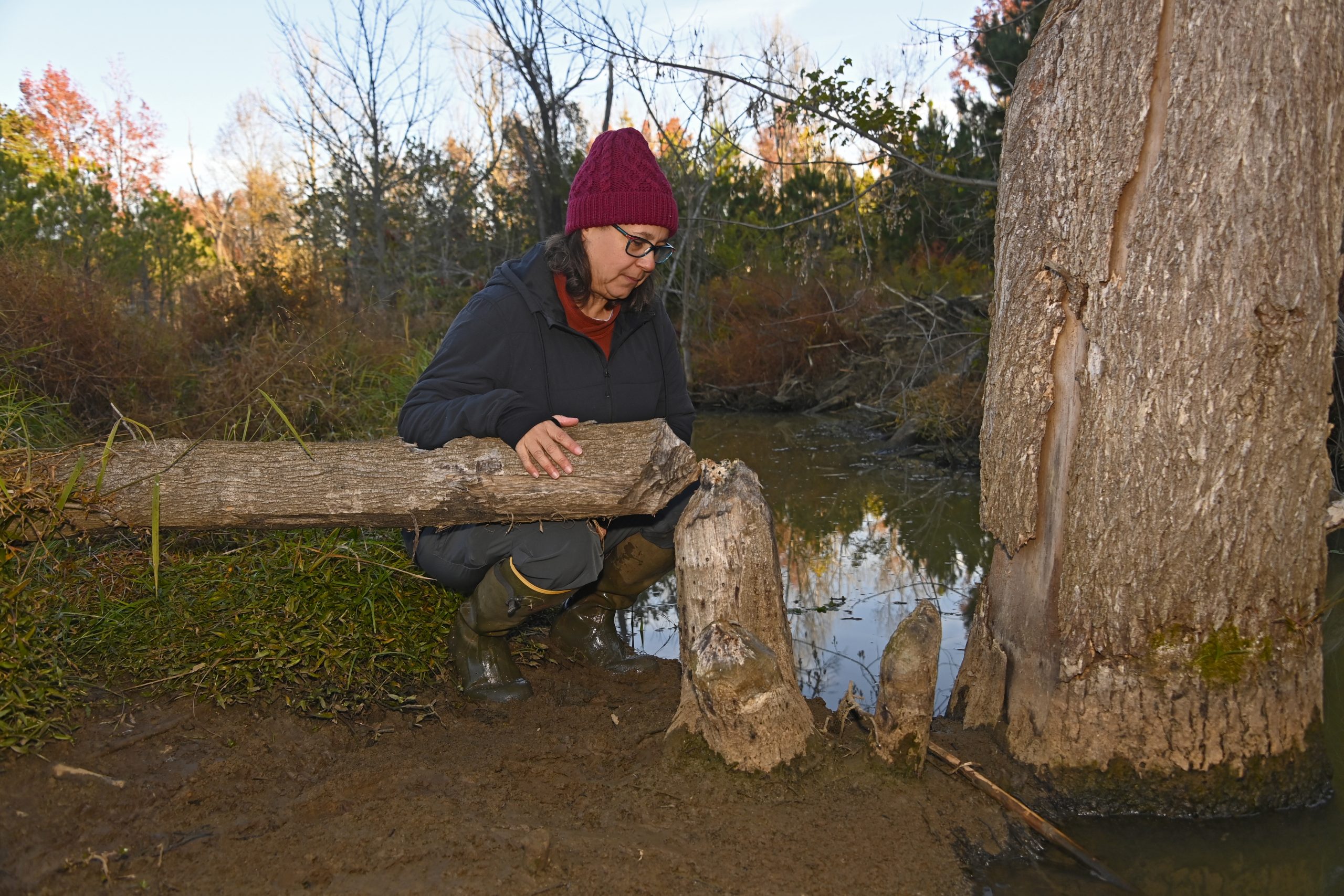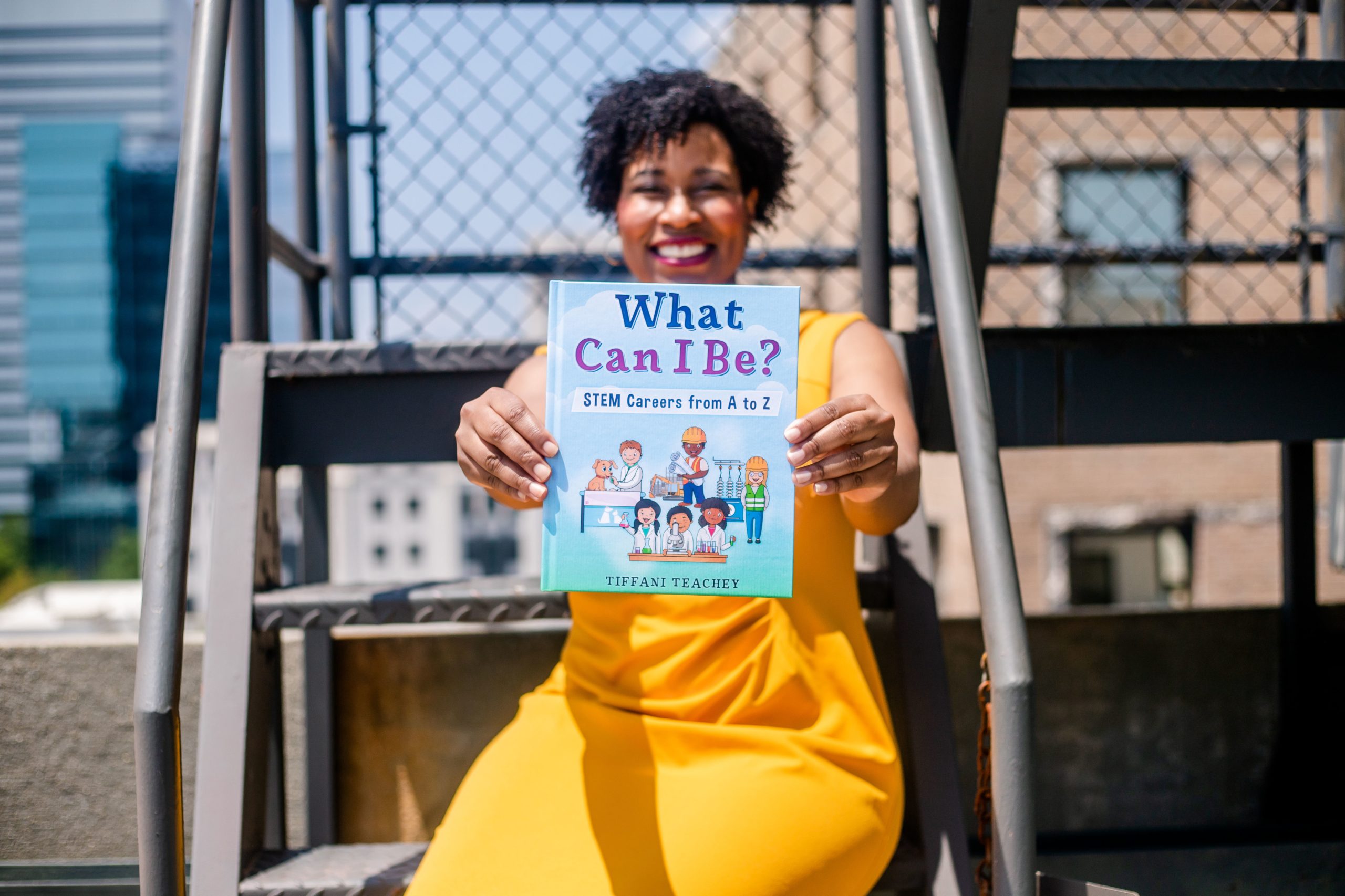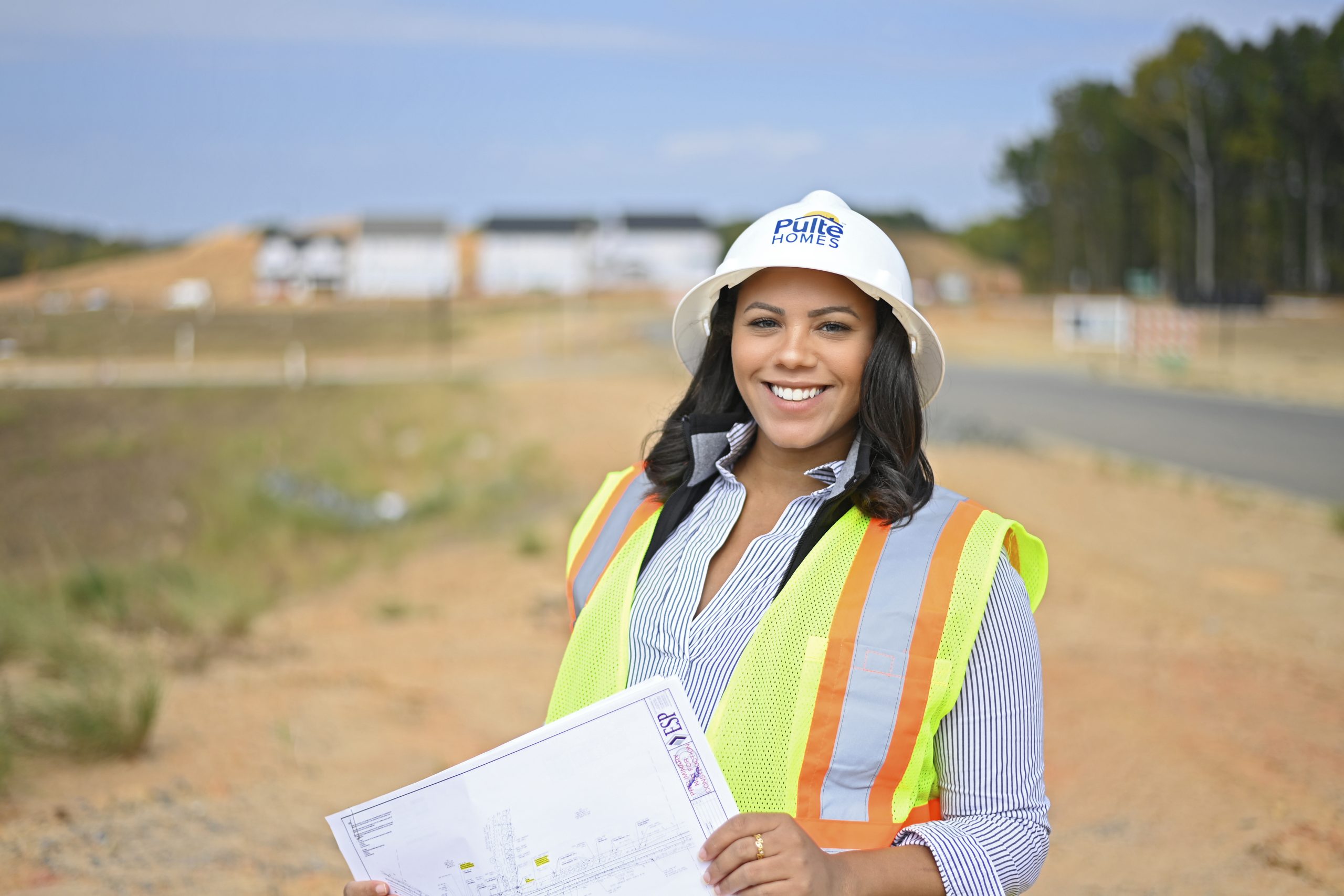Researchers and alumni inspire new generations of women STEM professionals

By Sonja Barisic
At UNC Charlotte, women in STEM — faculty, students and alumni — are making an impact on campus, in the workplace and within today’s fast-growing science, technology, engineering, and mathematics fields. Today, women at Charlotte represent 30% of undergraduate students, nearly 42% of graduate students and 40% of doctoral students who are studying STEM disciplines — up noticeably over the past decade, making parity an achievable target.
To help bring up their numbers — on campus and in the STEM workforce where women are still a minority — an impressive number of faculty and alumni STEM experts are actively encouraging talented women and girls to explore and enter these fields. They know that diverse voices and perspectives lead to better research and business outcomes. Through their teaching, writing and groundbreaking research, four of these formidable STEM leaders — two professors and two alumnae — are inspiring future generations of female STEM innovators.
Brittany Anderson: Identifying talent early to fuel interest

While growing up in Texas, Brittany Anderson was a gifted Black girl whose time spent with her grandmothers in the kitchen and their gardens introduced her to and sparked interest in food science and botany. At the time, Anderson didn’t recognize those as STEM subjects. She attended low-resource schools where “we just never had conversations about how STEM was accessible,” she said.
Anderson has carried that formative experience with her throughout her career, from her days as an elementary teacher and gifted education specialist consultant to her doctoral studies focusing on minority students in gifted education. And with findings from her research on gifted Black girls and STEM, she is determined for today’s gifted Black girls to have access to opportunities that drive early interest in STEM fields
Transformational Research
Now an assistant professor of urban education at UNC Charlotte, Anderson recently was awarded a $1.06 million National Science Foundation award for pioneering research that prioritizes the needs, talents, aspirations and unique intersectional experiences of gifted Black girls. It potentially will transform elementary education nationwide.
The project is called CAREER: Critical and Culturally Relevant Experiential Learning: Fostering Early STEM Exploration with Gifted and High-Ability Black Girls and their Elementary Teachers. Its purpose is to develop and study community-engaged programs that center STEM education pathways for gifted Black girls.
She recognizes gaps in talent identification for students of color, particularly girls, and limited opportunities for professional development for teachers in regard to hands-on learning and STEM. Anderson notes that Black girls are underidentified for gifted education.
“I approach these things at the intersection of race, gender, class and cognitive abilities,” Anderson said. “How do we disrupt these constrained pipelines for our kids?”
Her research explores the importance of university-school-community partnerships to promote talent development among Black and other minority girls from low-income backgrounds and help them realize STEM is an option for them.
“That’s a critical part of my project: How do we help Black and brown girls see that they engage in STEM all around them, all the time? How do I help them identify these interactions as STEM?”
Real Life Examples
Last spring, while working with teachers and girls at Druid Hills Academy in Charlotte, she introduced culturally relevant activities. For example, the students learned about the cosmetic science of hair and how synthetic hair is made.
“It was just so dynamic. They learned STEM is relevant to their life,” Anderson said. “They kept saying, ‘I didn’t know this was science, I didn’t know this was engineering.’”
“STEM can be things that are a part of their culture, their community and their lived-in experiences in their home,” she continued. “It makes STEM accessible, and it also makes it personal.”
Encouraging more Black girls to pursue STEM careers will bring new dynamics to STEM fields, Anderson said. “We can disrupt some of these whitewashed ways of doing things, and we can take this back into our communities.”
Sandra Clinton: Harnessing the power of mentorship

Sandra Clinton loved science from her earliest school experiences — and imagined a career working for a science-related nonprofit or government agency.
“I wanted to save the world and change it,” she said.
Clinton, a research assistant professor in UNC Charlotte’s Department of Geography & Earth Sciences, has found different ways to change the world through STEM. A river ecologist focusing on understanding human impacts on stream ecosystems, she currently studies how urban beaver ponds function compared to human-made stormwater ponds in maintaining the health of urban streams.
She’s also a leader with PROGRESS: Promoting Geoscience Research, Education and Success, a mentoring-based program to retain women in STEM, specifically undergraduate students who identify as women and are interested in earth and environmental science.
Mentoring drives retention
PROGRESS began with college students in the Carolinas — including at Charlotte — and in Colorado. It is now expanding to Texas and Georgia. Through funding from the National Science Foundation that has made new outreach possible, students are matched with peer and professional mentors, learn to network and gain practical skills.
A controlled study found that women in PROGRESS have more mentors compared with women not in the program — and higher retention rates in their degrees, explains Clinton, who leads the organization’s Carolinas section. The connection between mentors and retention is important.
“A lot of undergraduate women leave their STEM degree in their second year, for various reasons. Some suffer from imposter syndrome, thinking they are not good at science; and in some male-dominated programs, such as physics, women students can feel lonely,” Clinton said. “Seeing somebody like you can have a huge impact on whether or not you think you can do this.”
That’s what Clinton experienced when she met noted ecologist Nancy Grimm. After college, Clinton became a research technician at a lab at Arizona State University. Grimm, her supervisor, was one of the first women Clinton had ever worked with.
“She was a female professor doing river ecology, and she had a family,” Clinton said. “She showed me this could be a career.”
Greater diversity leads to better research outcomes
“People with different experiences and perspectives bring different ways of looking at research questions based on who we are as much as our training,” she said. “If everybody thinks the same way, science doesn’t progress.”
“Women make up more than half the planet,” Clinton added. “We need to be more than half the people at every table, not just the STEM table.”
Tiffani Teachy ’03, ’05: Engineering a path from A to Z

Tiffani Teachey was the curious girl unafraid to sit up front and ask questions in a math classroom dominated by boys.
“I didn’t care. I was going to ask those questions because I knew I wasn’t the only one in class who didn’t understand,” said Teachey ’03, ’05, a senior mechanical engineer at Westinghouse Electric Corp., and a 2022 UNC Charlotte Distinguished Alumni Award recipient.
That courage to speak up, she said, came from her mother, a teacher, and her father, an entrepreneur who owned a barbershop in Winston-Salem. They empowered Teachey and her brother to excel.
A client of her father’s who was a civil engineer suggested Teachey and her brother consider engineering careers. Wanting to be challenged, Teachey decided to do just that.
While her brother became a civil engineer, Teachey earned a bachelor’s degree in mechanical engineering and a master’s degree in engineering management from UNC Charlotte. She’s currently working toward a Ph.D. in leadership studies at NC A&T.
Women inspiring women
While considering where to attend college, Teachey visited Charlotte and heard Patty Tolley, then associate dean for the William States Lee College of Engineering, speak. “Her story of being a woman in engineering really stood out,” Teachey said. She chose Charlotte because of that presentation and opportunities for minorities, such as the summer University Transition Opportunities Program that helps underrepresented students transition from high school to college.
Seeing women in STEM careers and hearing their stories is key to encouraging more children, especially girls and minorities, to pursue STEM careers, Teachey emphasizes.
“Diversity is important,” she said. “It can’t be all men. You’ve got to have different mindsets and different thought processes.”
From engineer to author
To encourage children to explore career paths “from astronaut to zoologist,” Teachy has published an alphabet book, “What Can I Be? STEM Careers from A to Z.” The book has been translated into Spanish, French and Swahili. There’s also a teacher’s edition and a coloring book version, and she’s expanding the book into a series. Teachey also created STEM ChangeHER, a subscription box program that includes STEM-themed puzzles and other activities, books written by or about girls and women in STEM and affirmation cards to build girls’ confidence.
“I know how it was when I was growing up. There’s a need for curious kids to ask those questions,” said Teachey, who also is a mentor with Big Brothers Big Sisters. “My goal is to shape our future generation of STEM leaders, especially girls and other underrepresented minorities.”
Mellissa Oliver ’12: Paying forward the value of mentorship

Mellissa Oliver ’12 learned early the positive influence of a mentor. In elementary school, she was paired with an adult lunch buddy, René Whitesell, who became a lifelong friend and inspiration. Whitesell’s influence was invaluable to Oliver, who’s family — four children led by a single mother — had limited resources.
They continued to spend time together long past the lunch buddy program. Whitesell helped Oliver with her college applications and moved her in on her first day at UNC Charlotte, where Oliver would earn a bachelor’s degree in civil engineering. She also was the maid of honor at Oliver’s wedding.
“She’s essentially my guardian angel,” said Oliver, a land planning and entitlement manager with PulteGroup in Charlotte. “She showed me how good people can be. I want to be someone like her.”
Passing the torch
Oliver — now a community leader — strives to encourage young people who are interested in STEM careers like hers. Like Whitesell, Oliver tries to connect with them and open their eyes to possibilities. She is deeply involved with ACE Mentor Program, a national nonprofit that offers afterschool programs to attract high school students to pursue careers in architecture, construction and engineering. Oliver is chair of ACE’s Charlotte affiliate and has served as a mentor and board member.
She is especially interested in encouraging more girls to pursue STEM careers.
“Women and young females bring so much to the table,” she said. “Sometimes they can’t see it themselves, so they need a little push.”
Oliver decided to study civil engineering because she likes to know how things work. “I love infrastructure and communities and buildings,” she said. Her civil engineering expertise supports her role as a developer, helping her look at the big picture and spot any problems early in a project.
Awards and Accolades
At Charlotte, she participated in clubs such as the Society for Hispanic Professional Engineers, and she received the Outstanding Senior Award from the William States Lee College of Engineering. Other honors include a Charlotte Business Journal 40 Under 40 award, an Axios Charlotte 30 Under 30 award and a Young Alumni Chapter 10 Under 10 award spotlighting outstanding alumni who have graduated within the past 10 years.
“When you go into STEM, your options are wide,” Oliver said. “A four-year STEM degree and experience opens so many doors.”
Sonja Barisic is a freelance writer based in Norfolk, Virginia
